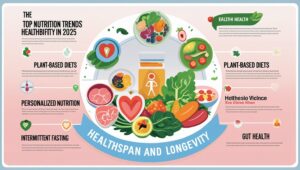Top Nutrition Trends for Healthspan and Longevity in 2025 Living longer is no longer the ultimate goal. In today’s world, people want to live longer and better—years filled with energy, mental sharpness, and freedom from chronic disease. This focus on healthspan (the period of life spent in good health) is shaping how we eat and think about nutrition. As we move into 2025, science, technology, and lifestyle awareness are transforming the way we approach food. People everywhere are beginning to wonder: “How can I weave more vibrant, healthy years into the span of my life?” rather than simply, “How can I live longer?” Below are the leading nutrition trends for 2025 that support both longevity and vibrant health.

AI and DNA Powered Personalized Nutrition
AI and DNA-Based Personalized Nutrition The era of generic diet advice is fading fast. Thanks to DNA testing, gut microbiome analysis, and artificial intelligence, 2025 is ushering in precision nutrition. Companies like Zoe, Inside Tracker, and Nutrigenomics are already creating eating plans customized for each individual’s genetics, metabolism, and gut health. These plans address issues such as inflammation, blood sugar spikes, and nutrient gaps.
Must Read: 12 Proven Ways to Lose Belly Fat Quickly
Why it matters:
Tailored nutrition makes it possible to slow down aging, keep your metabolism strong, and reduce the risk of lifestyle diseases.
- Dr. Valter Longo’s Longevity Diet continues to grow in popularity in 2025. This approach emphasizes:
- Mostly plant-based foods—beans, nuts, fruits, vegetables
- Minimal animal protein (except for older adults who need extra)
- Intermittent fasting or fasting-mimicking diets
- Avoiding refined carbs and sugars
- This pattern of eating is linked to lower risks of cancer, diabetes, heart disease, and even cognitive decline.
Why this matters:
It’s less about strict calorie cutting and more about nourishing the body while reducing cellular stress.
Must Read: The 10 Best Vegan Meal Delivery Services in 2025
Functional Foods for Anti-Aging
Food in 2025 is no longer just about calories—it’s also about healing and prevention. Functional foods are those that provide additional benefits beyond basic nutrition, and they’re becoming mainstream.
Gut Health Means Longevity
A thriving gut microbiome is emerging as one of the most powerful predictors of healthy aging. Research in 2025 shows that balanced gut bacteria can:
- Boost immunity
- Reduce inflammation
- Improve mood and mental health
- Lower the risk of chronic disease
- How to support gut health:
- Eat prebiotic-rich foods like onions, leeks, and garlic
- Bring into your daily nourishment the power of fermented foods—yogurt, kefir, kimchi, and sauerkraut— treasures alive with beneficial cultures.
- Add polyphenol-rich foods like berries and dark chocolate
- Why this matters:
A healthy gut can influence everything from digestion to your brain and energy levels. - Examples include:
- Lion’s mane mushrooms for memory and brain health
- Turmeric and curcumin for inflammation control
- Matcha and green tea for antioxidants
- Blueberries and dark berries for brain support
- Seaweed and algae for omega-3s and trace minerals
Why this matters:
These foods strengthen the immune system, repair cells, and help keep the brain young.

Omega-3 Fatty Acids Get More Respect
Omega-3 fatty acids, found in fatty fish, chia seeds, flaxseeds, and algae, have long been praised for heart health. In 2025, studies show their benefits extend even further:
- Protecting the brain from age-related decline
- Reducing chronic inflammation
- Supporting joint and eye health
- Slowing biological aging through longer telomeres
Why this matters:
A regular dose of omega-3s is now considered a core habit for longevity.
Must Read: 9 Benefits of Protein for Health and Athletic Performance
Plant-Forward but Not Strictly Vegan
Unlike previous years where vegan diets were trending, 2025 is seeing more plant-forward eating with some flexibility.
- Think Mediterranean-style meals:
- Mostly plants
- Occasionally high-quality animal proteins like fish or pasture-raised eggs
- Whole, natural foods rather than processed substitutes
Why this matters:
This flexible approach supports both human health and environmental sustainability.
Senolytic Foods: Battling Cell Aging
One of the most exciting areas of nutrition research involves senolytic foods—foods that help clear out damaged, aging cells known as “senescent cells.” These cells accelerate aging when they build up in the body.
- Key senolytic foods:
- Fisetin (found in strawberries and apples)
- Quercetin (in onions, apples, and capers)
- Curcumin (from turmeric)
- Why this matters:
These compounds may help reduce inflammation and keep organs functioning well as you age. - Key senolytic foods:
- Fisetin (found in strawberries and apples)
- Quercetin (in onions, apples, and capers)
- Curcumin (from turmeric)
Why this matters:
These compounds may help reduce inflammation and keep organs functioning well as you age.
Must Read: 8 Morning Routine Habits That Will Change Your Life
Why it’s crucial:
Clearing senescent cells decreases inflammation, enhances organ function, and postpones age-related deterioration.

Intermittent Fasting & Time-Restricted Eating
Fasting remains one of the most powerful trends for healthspan. Popular fasting methods in 2025 include:
- 16:8 fasting: 16 hours of fasting, 8 hours of eating
- 5:2 fasting: Five normal eating days, two days with restricted calories
- Fasting-mimicking diets: A few times per year under guidance
Why this matters:
Fasting encourages the body to clean out damaged cells (autophagy), stabilize blood sugar, and reduce inflammation.
Targeted Supplements Instead of Guesswork
The random multivitamin approach is out. In 2025, supplements are selected based on lab tests, genetics, and wearable data.
- Popular longevity-focused supplements include:
- NAD+ boosters (NMN, NR) for cellular energy
- Magnesium for the brain and heart
- Vitamin D with K2 for bones and immunity
- DHA/EPA omega-3s for brain and heart
- Plant polyphenols such as resveratrol and quercetin
Why this matters:
Precision supplements fill gaps that diet alone cannot always cover.
Sustainable Eating for a Healthy Future
Healthspan isn’t only about personal wellness; it’s also linked to the planet’s health. Diet patterns in 2025 emphasize:
- Minimizing ultra-processed foods
- Eating local, seasonal produce
- Choosing regenerative farming products
- Reducing factory-farmed meat
Why this matters:
Better soil and farming practices mean more nutrient-dense food, fewer toxins, and a healthier environment.
Conclusion
In 2025, our approach to eating has become more enlightened, individualized, and anchored in solid science. From AI-powered food planning to gut health, from fasting to senolytic foods, the goal is clear: to enjoy a longer life full of vitality and purpose. What you put on your plate today shapes how well you will live tomorrow.
FAQs
1. Is the longevity diet suitable for everyone?
For most people, yes. This way of living is shaped around whole, plant-forward foods, nourishing fats, and a balanced intake of protein. For those in later years, there is a gentle reminder: a bit more protein can help safeguard strength and preserve lean muscle.
If you could today make one dietary change to enhance your healthspan, what would it be? Let us know in the comments below!”

Zain Ul Hassan is the founder of Zaha Fitness. He writes practical, research-backed articles on fitness, weight loss, and natural health. His goal is to help people live healthier lives using simple and effective tips.
